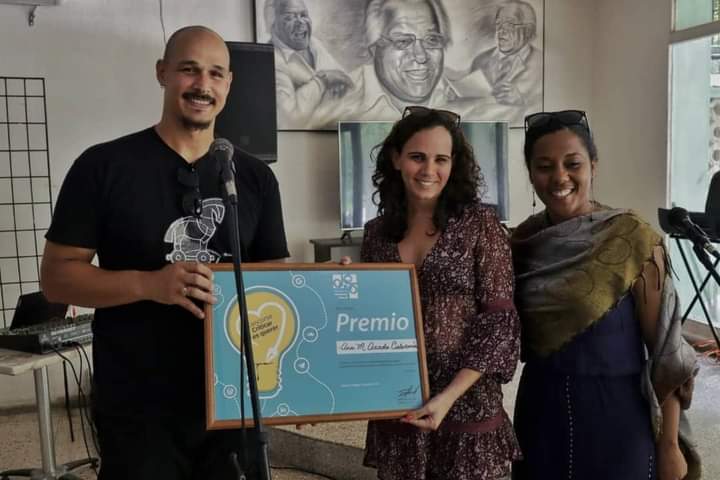
Art historian Ana Margarita Arada Clavería, president of the Hermanos Saíz Association (AHS) in the province, won the third edition of the Criticar es Querer Contest, organized by the Camagüey branch of that organization and the Union of Cuban Journalists (UPEC, in Spanish), a result recently announced in the context of the 6th National Colloquium of Cultural Journalism.
Las Tunas, Cuba. - The young woman participated with the article Clowncierto: La Ciudad se va a Morir (Clownconcert: The City will Die), which - according to the jury's opinion - "is a suggestive chronicle that starts with a theatrical performance well described and reviewed to face a phenomenon related to the performing arts with a strong repercussion in the theater of Las Tunas in a general sense". She also recognizes the use of a "simple language, but with technical handling of theatrical dramaturgy and concepts associated with the audience and the performance."
In an interview with 26, the researcher of Las Tunas said: "The work is based on my experiences as a spectator of the play Clowncierto, by Teatro Tuyo, which I took as a reference to talk about the situation of the performing arts in the province. I construct the discourse inspired by the play's message of not letting our city, culture, and the art of the stage die."
Ana Margarita acknowledged that, beyond the award, it was a great opportunity to participate in the Colloquium because it fostered the exchange of knowledge and professional growth. "I left the City of the Tinajones with many desires to do and deepen in cultural journalism, from an analytical vision, with investigative and critical foundations, which promotes artistic processes. We cannot remain only in descriptive or informative aspects, nor only exalt; we have to put the eye where sometimes it is not put."
"Criticism is necessary, as much as the artistic fact itself. Art has to be in essence renovating, transgressive. If it doesn't have a meter that says what its aesthetic lines are, what is being done well and badly, and what can be perfectible..., it stagnates, not only the artistic fact but also the associated processes. That is precisely what criticism is for, which for me -in addition- is sensitivity, ethics, sincerity, and commitment to art. It also travels to the past, delves into the present, and projects itself into the future."
She confesses that he embraced art criticism by chance. She began researching for her thesis on the conceptual and formal foundations of the work of sculptor Rafael Ferrero Lores, then worked in the Department of Art Education at the University of Las Tunas and, finally, came to the AHS as a contributor to its website, writing for the first time for the Entre Música Festival. Already familiar with the work of the Casa del Joven Creador, she joined the Criticism and Research Section. And since then she has become more immersed in the cultural scene, to the point of becoming the president of the AHS.
"I have written on various topics, but especially on visual arts, say salons of the Union of Writers and Artists of Cuba (Uneac in Spanish), as well as personal or collective exhibitions. I have also collaborated with the web page of that institution and with the cultural magazine Quehacer, of our territory. Likewise, I continue researching Ferrero's work and I am currently interested in delving deeper into topics such as the gender perspective and the actions of women creators. Whenever there is an issue that moves me and moves my thoughts, I will need to write," said Arada Clavería.
The youth artistic avant-garde has opened the wings to this simple girl with a good soul, who is beginning to fly beyond the Balcón de Oriente. Since 2018, the year in which she joined the ranks of that collective, one of her greatest joys has been the critical meeting La Última Palabra (The Last Word), born in 2020, in times of pandemic.
"It has as antecedent a similar space called Las ruinas circulares. Its genesis was in the social network Facebook, where various materials were shared. Once it was possible, we moved the meeting to a face-to-face version. It was held for the first time on March 8, dedicated to women creators in Las Tunas. I have tried to ensure that, apart from being an event that opens its doors to research, it should be conducive to confrontation and debate. For that reason, a theme is proposed and the guests present their criteria, analysis, and suggestions. We have talked about art and religion, audiovisuals, the pictorial universe, and more."
Another of her satisfactions is that thanks to the impulse of the Section of Criticism and Research of the AHS here, the Rafael Ferrero Conference, El Oficio de Una Vida, was born in the last calendar, with annual character, and includes a colloquium in which areas such as heritage, visual arts, and identity are approached.





